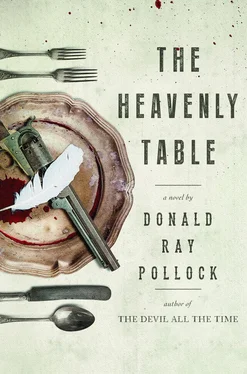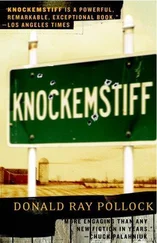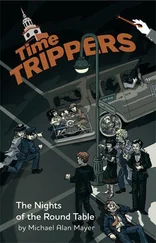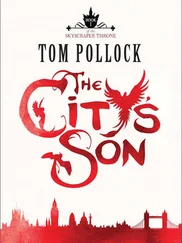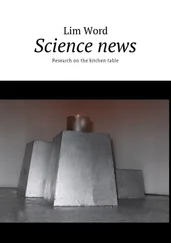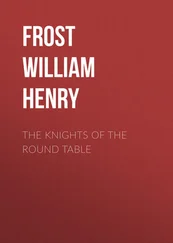Cob thought for a second, then said, “Junior. Junior Bradford.”
“That’s right,” Cane said. He looked over at Chimney. “Hollis, you let me do all the talking.”
Ellsworth was slumped over in his rocking chair when Eula awakened him with a shake. When he first opened his eyes, he thought he must be dreaming. Before him were three men, red-eyed and sweaty and caked with dust, mounted on horses. Rearing up in the chair, the farmer rubbed violently at his face, then said, “What the hell?”
“Howdy,” Cane said. “Sorry if we scared ye.”
Ellsworth’s eyes shifted back and forth as he took a hard look at each of the three in the dusk. “That’s all right,” he replied. “Didn’t hear you ride up is all.”
“Pardon?” Cane said.
“He’s got a cold,” Eula said.
“Jesus,” Ellsworth muttered under his breath. He turned and hacked up a ball of grit, spit it over the railing. “What can I do for ye?” he said, raising his voice with effort.
“Well, my brother here, he’s got a hurt leg, and we’re needin’ a place to rest up a day or two.”
Ellsworth glanced over at the chubby one, a friendly-looking boy with a smile on his round face, a filthy piece of cloth wrapped around his thigh. “What did he do to it?” he asked.
Cane shook his head. “Just a dumb accident. Playing around with a gun and it went off.”
“That sounds like something Eddie would do,” Eula said.
“Where ye headed?” Ellsworth said. “Going to join the army in Meade, I bet.”
“Well, no,” Cane said. “We’re headed for—”
“Why not?” Eula said. “That’s what our boy done, and he ain’t but sixteen.”
“It’s not that we don’t want to,” Cane said carefully. From what he’d read in the newspapers, he knew that many people weren’t taking this war business lightly. In fact, they had become quite nuts about it, going around kicking dachshunds to death, making ninety-year-old Americans with German-sounding names get down on their knees in the streets and kiss the American flag, calling sauerkraut Liberty cabbage and hamburger Salisbury steak. Searching factories and mines for terrorists, and taverns for hidden hordes of pretzels. And if they happened to have a family member in uniform, they were often twice as zealous when it came to sniffing out slackers and potential traitors. Maybe, Cane thought, they figured it wouldn’t hurt so much if their son got his ass blown off as long as there was a good chance the neighbor’s boy would suffer the same fate. There were few things in the world that put all people, regardless of education or wealth or place in society, on equal footing, but heartache was one of them. “It’s just…it’s just that…” He turned and looked at Cob, then back at the farmer and his wife. “Mind if I get down?”
“Go ahead,” Ellsworth said.
Cane eased off his horse and stepped up to the porch. “Thing is,” he whispered, leaning toward the couple, “my brother there ain’t right in the head, so someone’s got to watch over him all the time. It’s not his fault, he was born that way, but there’s no way they’d take him in the army. As ye can see, he can’t even handle a gun.”
“Oh, my,” Eula said, looking over at Cob. Because of her poor dead mother, she had always harbored a soft spot in her heart for the mentally challenged. And she knew how difficult it was to keep one safe. No matter how closely Eula and her father watched over her, Josephine had always found some way to slip out of the house at night. “Well, it’s good of you to take care of him. Not a lot of young men would do that.”
“Thank you, ma’am.”
“And who’s the other one?” Ellsworth said.
Cane glanced back at Chimney, then said, barely able to suppress a smile, “That’s our cousin, Hollis. He’s not quite playin’ with a full deck, either, but he ain’t as bad off as Junior.” He straightened up and looked over at the barn. “So you farm?”
“I try to,” Ellsworth said.
“It can be a hard life sometimes.”
“You ever done it?”
“Sure,” Cane said. “It’s all we’ve ever done.”
“Where would that be?” Ellsworth asked.
“Georgia mostly. Then Pap died a while back, and we lost the land.”
“How’d you come to lose it?”
“Back taxes mostly,” Cane said. “That’s why we’re going to Canada. We got an uncle lives up there.”
“Canada? That’s quite a ways off, ain’t it?”
“Well, to tell you the truth, I’m not sure. I just know we got to keep heading north.”
Ellsworth settled back and nodded approvingly. At least the boy was honest. He figured that owning up that you didn’t know the location of Canada was just as embarrassing as admitting that you didn’t know the whereabouts of Germany. And having your farm taken away because of back taxes was as bad as losing your life savings to a checkered-suited con man. Maybe even worse. He reckoned they might have quite a bit in common.
“Them your horses?” Ellsworth asked.
“Yes, sir.”
“What’s their names?”
“How’s that?”
“Their names. Even my old mule’s got a name.”
“Right,” Cane said slowly, a slight hesitation in his voice. Of all the questions someone might ask, the old man wanted to know the names of the horses? Shit, Cob was the only one who’d ever called his anything other than “horse,” and he gave his a different handle damn near every day. “Well, this one—”
“Thunder, Lightning, and Hurricane,” Chimney said quickly, pointing to each.
“Buck’s what I call my mule,” said Ellsworth.
Chimney nodded. “That’s a good name for one. We used to have—”
“We can pay,” Cane cut in, trying to get the conversation back on track before his brother said something stupid.
“What?” Eula asked, coming forward in her chair. “What’d you say?”
“I said we can pay.”
“Boys, I hate to turn you down,” Ellsworth started to say, “but we—”
“Hold on a minute,” Eula said, lightly touching his arm to shut him up. All the time Ellsworth had been dozing, she’d been worrying again about how they were going to make it. Everything was tied up in the corn, but, as he kept telling her, with the summer having been so dry, they’d be lucky to get forty bushels an acre. And that was if he could get it all put up by himself. Though she was proud of Eddie for enlisting in the military, he surely couldn’t have picked a worse time. They didn’t even have a calf to sell this year. Perhaps the strangers’ arrival was some sort of sign that the Good Lord hadn’t entirely forsaken them. After all, when was the last time anybody rode in and actually offered them money instead of taking it? Never. “How much?” she asked.
“Oh, I don’t know,” Cane said. “Could you fix us something to eat?”
“Sure, I can cook,” Eula said.
“Well,” he said, scratching his head, “how about twenty a day? Would that be all right?”
Eula’s heart began beating a little faster. “How many days are we talking about?”
“Three, maybe four. Just till Junior’s leg gets better.”
“But, Eula, where are they going to sleep?” Ellsworth asked. “We don’t have—”
“Hold on and let me think for a minute,” she said. Good God, man, she thought to herself, who cares where they sleep? We’re talking about sixty dollars here, maybe more. They could sleep in her bed for that much money. Of course, feeding them would use up a lot of the food she had stored back for winter, but they’d still come out way ahead, even if she had to kill half the chickens. Wait a minute, though. How could she be sure they weren’t just trying to pull one over on a couple of old people? Just looking at them, you wouldn’t think they’d have two nickels to rub together. “Can you pay something in advance?” she finally asked.
Читать дальше
